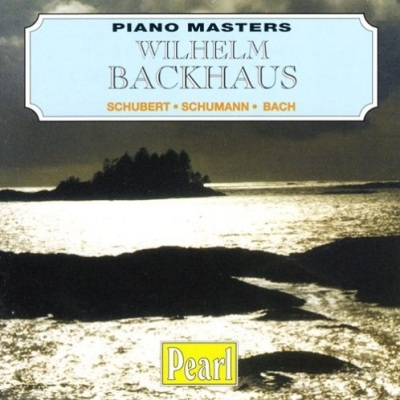
Piano Masters: Wilhelm Backhaus
Wilhelm Backhaus (1884-1969) was one of the best pianists of all times. He was both a great interpreter with an infallible sense of music structure and a great virtuoso with a noble tone. He could capture a listener with a single move (cf. the final chord in track 11 or the beginning of track 12), a short pause or intentionally slightly desynchronized hands (a device from the XIXth century). His style relied on strong rhythmic pulse and dynamic accents rather than on chiaroscuro or excessive rubato. His touch was especially attractive and easily discernible on forte: Backhaus did not need to bang out the soul of the piano in order to sound strong, virile and demonic (try the beginning of track 15, Schubert-Liszt's Caprice). Backhaus enjoyed universal esteem from his colleagues, but the public opinion was less kind, since he destroyed two popular myths: that a romantic has to be sentimental and that a virtuoso is necessarily a showman who boasts his technical superiority. This fabulous compilation offers recordings made in the electric period (1928-1937). Backhaus belonged to those great artists with big yet focused sound who gained much from the invention of the microphone (the great dramatic tenor Giovanni Martinelli whose art is lovingly represented on the same label - Pearl may as serve as another example). Acoustic recordings of Backhaus, good as they are, don't show his deep tone and pianistic brio at full. Here you have it: the transfers are simply excellent, given an early date. There were two more factors in play: Backhaus liked the recording process and was at the peak of his powers. As a result, he left us some of the most perfect recordings of the pre-war period which easily meet competition with other contemporary versions and sometimes outclass later remakes of Backhaus himself. This CD includes some of Backhaus' favourites, which he played throughout his life. But other items, for instance, Schumann's Fantasy in C (1937) are not available elsewhere. It is the Fantasy this CD is usually advertised for. It is of course great to have it with Backhaus and he does not disappoint. His conception is original: the first movement is played calmly and does not sound "Leidenschaftlich vorzutragen" from the beginning, but the last two movements are fantastic (excuse my pun). There is beautiful legato, refined dynamic accents, slight rhythmic shifts and other tricks only a great pianist with an absolute control can play. But personally I prefer more warm and sensual renderings of Moiseiwitsch (available on Testament) and Gieseking (there are at least two versions), though Gieseking could not compel with Backhaus' technical abilities. What makes this CD extraordinary, is unbelievable playing of Schubert and Bach. There are two sets of preludes & fugues from the first volume of Well Tempered Clavier. BWV 846 C-dur (the so called "Ave Maria" prelude plus corresponding fugue) suffers a bit from excessive pedaling, but the second pair, BWV 867 b-moll (the CD program mistakenly claims it is BWV 866 B-dur) is both expressive and musically transparent. I am sure these 5 minutes are one of the greatest Bach recordings of the XX century. Why didn't he record the whole WTC, if he felt it so deep? We could then compare it with the version of another giant - Edwin Fischer.. A comparison with Edwin Fischer and Artur Schnabel emerges again in the second half of this CD, where Backhaus plays Schubert. One could say that he is playing on their territory. But it was his territory as well! Backhaus has recorded the Moment musicaux No. 3 f-moll Op. 94.3 many times. This version (1928) is the best one I know: the maestro's touch is so soft here and he plays with a greater freedom than in his late years. Another high point of the CD is Schubert's Impromptu B-dur Op. 142. 3 (1928). I love Edwin Fischer's recording of Impromptus: I am brought up on it! But Wilhelm gets from this Impromptu more than Edwin. Strange enough, he provides a more improvisatory impression than Fischer here: abrupt changes of mood, motifs and tonalities always feel organic by him. In the somber central episode in minor Backhaus makes the piano sing and listeners weep. He played the same piece as an encore at his Carnegie Hall recital (11 april, 1956 - available on the Haenssler/Profil label): it is good, but doesn't match the level of this 1928 version. Again, why didn't he record other Impromptus? (there exists a post-war recording of the Es-dur Impromptu on the Andante label, but I have not heard it yet). The minuet from Schubert's sonata Op. 78 is the only fragment of Schubert's sonatas in W.B's discography: it is played in a genuine and idiomatic Schubert style. The Schubert-Liszt item (Caprice Soiree de Vienne No. 6) is an effective showpiece, but a later version from early 1950-s is equally impressive. The military march in E flat Op. 51. 3 is often played in a four-hand version. But why not play it with two hands, if you are Wilhelm Backhaus? Grab this CD before the bandits remove it from the list!!! They did it with Chopin's Etudes w. Backhaus (1927): I tried to order it directly from Pearl, but in vain.
